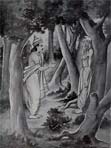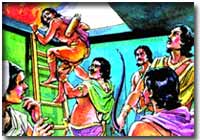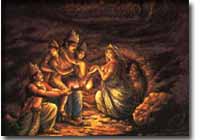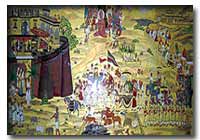THE WAX PALACE
 |

The formidable combination had its natural repercussions and counter reactions in the minds of Kuaravas headed by Duryodhana. Dhritarashtra of course was very much attached to his sons but never lagged behind in public demonstration of his love for his brother's sons, the Pandavas. The poor blind king did not know what to do when the two were divided into opposite teams. While he was on the horns of dilemma Duryodhana approached him to plead his case. "Dear father," he said, "something must be done to solve this problem. All of our brothers feel orphaned while you are alive. Look at the public image the Pandavas have for themselves with relentless assiduity. They are instigating the people against you. Now the people are saying in open streets that it is high time that the doting blind King abdicates in favour of Yudhisthira.
They have already given him the epithet of Dharmaraja, the righteous King, in anticipation of his early installation on the throne. You are elder to Pandu and it is your mistake to have allowed him to rule as an independent sovereign. The second mistake you have committed is to proclaim Yudhisthira as the Yuvaraja – to be the heir apparent to the throne. Then what about us? Are we to live as second rate princes dependent entirely on the benevolence of the Pancha Pandavas? Owing to your so called goodness you have unwillingly betrayed the interests of your own children. We cannot expect Bhima or Vidura or anybody else to champion our cause when we are betrayed by our own father. Yudhisthira will soon become the King. We will then have to be at the mercy of the Pandavas. Hell will be better than such a life."

Public memory is proverbial short and people will soon forget them. As for Bhishma he will never assert himself against the authority of the King in view of his vow. Asvatthama psychologically will be on our side in spite of his apparent neutrality and Drona cannot openly champion their cause in view of his extraordinary attachment to his son. "Vidura is too much attached to you to defy you. The sermonizing chatter box is not a man of action. His irrelevant prattle is mistaken for philosophy by ignorant multitude. Anyway he is too cultured to engineer any open harm to anybody. On my side the ever dynamic Duhasasana, my brother, uncle Sakuni of unfailing intellect, are there. Last but not the least, Karna, the unique hero in the universe has been the most remarkable reinforcement to our side. We the four can act decisively.
Dhritarashtra gave a patient hearing to his son but could not make up his mind quickly. However the gang of four hatched a conspiracy with meticulous care. Varanavata was extolled indirectly in the presence of Pandavas for its verdant fields and virtuous people, commendable climate and cultural atmosphere. A pre-arranged deputation of the people of Varanavata came to Hastinapura and extended an invitation to the Pandavas to witness the annual festival to be celebrated there shortly in honour of Lord Shiva. Kanika the minister of Sakuni was chosen for brain washing Dhritarashtra. Kanika who was known as an astute politician went to Dhritarashtra ostensibly to discuss the principles of polity and state craft dinned into the ears of the blind king choosing appropriate opportunities that the interests of the sons must be safeguarded by the father. He said to Dhritarashtra finally "The Pandavas may be good but their goodness will be a menace to your sons. They may be the sons of your own brother but authorities on polity declare that potentially fire is less dangerous than the kith and kin, who are as a rule deadlier if dearer.

The Pandavas were prepared to go to Varanavata in accordance with the directions of king Dhritarashtra and took leave of Bhishma, Drona, Kripa and others. Bhishma who desired that the Kauravas as well as the Pandavas should live in peace and harmony thought a temporary separation might ease the tension between the two groups and gave his blessings for their depature. Drona, who was quite apprehensive of the designs of the gang of four, thought Varanavat might be a safer place for Pandavas than Hastinapura. However Vidura knew fully well that imminent danger awaited the arrival of the Pandavas there. Vidura proved to be a practical idealist instead of a philosopher of Duryodhana's miscalculation. On the departure of the Pandavas to Varanavata Vidura spoke to Yudhisthira in detail about the conspiracy hatched by Duryodhana in the Mleccha language. Vidura gave all the details of the plot. Purochana, the minister of the state, was sent to Varanavata already and he is constructing a palace of wax using the most combustible materials. On a suitable date after lulling everybody to complacency the palace of wax will be set to fire. All precautions were being taken to give it an appearance of a random accident. You must behave as if you know nothing taking all counter precautions. Of course I will try to help you in every way but I am confident of your resourcefulness." Pandavs followed by Kunti Devi went to Varanavata. But the exhilarating excursion they once contemplated turned out to be a dangerous journey into a dismal death trap.
Yudhisthira apprised his mother and all the brothers with all the details of the death trap and cautioned about Purochana. The Pandava princes recollected the philosophical discourses given by Vidura on the eve of their departure. Vidura enunciated the philosophical truth pregnant with meaning. "The conflagration that consumes the whole forest cannot hurt a rat hiding securely in its hole or a porcupine which burrows the earth." The Pandava brothers decided to be extremely vigilant and escape from the death trap, so ingeniously laid for them. The citizens of Varanavata gave a rousing reception to the Pandava Princes and temporary accommodation was provided to them till the palace under construction was ready for occupation. Purochana the minister sent in advance by Duryodhana met Yudhisthira and told him, " Your Excellency, I am asked to supervise the construction of the palace to be occupied by the princes. It is almost ready and final touches are given." Yudhisthira thanked Purochana profusely and treated him with exceptional cordiality and utilized his services to get all the sundry jobs done. Purochana never knew that the Pandavas were secretly supervising the work done by him.

